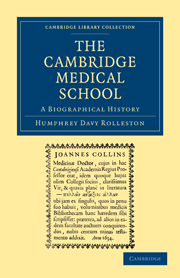Book contents
- Frontmatter
- Contents
- List of Plates
- Preface
- I The Medical School
- II Department of Anatomy
- III Department of Physiology
- IV Department of Biochemistry
- V Department of Experimental Psychology
- VI Department of Pathology
- VII Department of the Quick Chair of Biology
- VIII The Regius Chair of Physic
- IX John Caius
- X The Downing Chair of Medicine
- XI The Linacre Lectureship in Physic
- XII The Chair of Surgery
- Index of Persons
- Index of Subjects
- Plate section
V - Department of Experimental Psychology
Published online by Cambridge University Press: 07 September 2010
- Frontmatter
- Contents
- List of Plates
- Preface
- I The Medical School
- II Department of Anatomy
- III Department of Physiology
- IV Department of Biochemistry
- V Department of Experimental Psychology
- VI Department of Pathology
- VII Department of the Quick Chair of Biology
- VIII The Regius Chair of Physic
- IX John Caius
- X The Downing Chair of Medicine
- XI The Linacre Lectureship in Physic
- XII The Chair of Surgery
- Index of Persons
- Index of Subjects
- Plate section
Summary
THE history of the origin of experimental psychology in Cambridge is of interest, as it was originally so closely connected with the Department of Physiology. As long ago as 1877 James Ward (1843–1925), the first Professor of Mental Philosophy and Logic (1897–1925), and John Venn (1834–1923) put forward a proposal for a laboratory in psychophysics; had it not been successfully opposed on the plea that it was irreligious to put the human soul into a scale of quantities, Cambridge would have led the world in this respect. W. Wundt (1832–1920), who developed from being a physiologist into a psychologist, was in 1879 the first to organize a laboratory of experimental psychology in Leipzig. Ward obtained a University grant for psychological apparatus in 1891; in the same year Michael Foster set apart a room in his laboratory for psychological work on the special senses, and in October 1893 brought to Cambridge, as lecturer on the physiology of the sense organs, W. H. R. Rivers (1864–1922), who in 1897 was appointed University Lecturer in Physiological and Experimental Psychology. In November 1907 this lectureship was suppressed and two new ones substituted, (i) on the Physiology of the Senses, which Rivers held until 1916, and (ii) on Experimental Psychology, connected with the Special Board for Moral Science, which his pupil C. S. Myers, of Gonville and Caius College, held until January 1921, when he was made Reader in that subject.
- Type
- Chapter
- Information
- The Cambridge Medical SchoolA Biographical History, pp. 100 - 101Publisher: Cambridge University PressPrint publication year: 2009First published in: 1932

